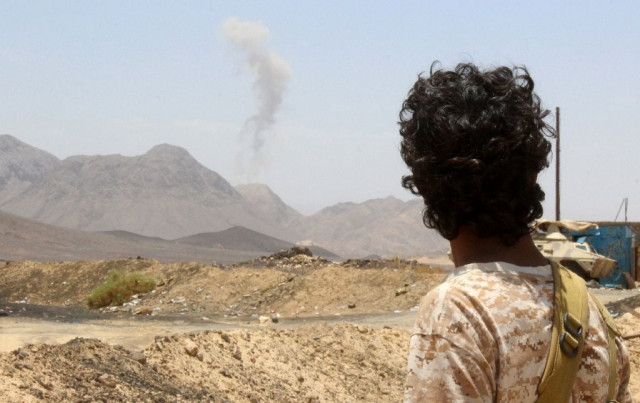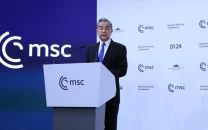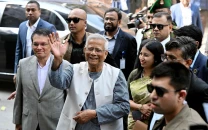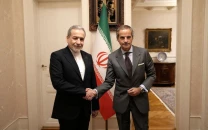Warring sides pledge support as Yemen truce begins
The truce was only agreed by the warring sides after months of shuttle diplomacy by the UN envoy

A Yemeni fighter loyal to exiled President Abedrabbo Mansour Hadi looks at smoke rising in the distance in the Sirwah area, in Marib province, on April 10, 2016. PHOTO: AFP
Fighting over the past year has killed thousands, displaced 2.4 million, and drawn in Yemen's neighbours.
The chief of staff of forces loyal to President Abedrabbo Mansour Hadi confirmed "the ceasefire has taken effect" at 2100 GMT.
General Mohamed Ali al-Makdashi told reporters that "we are going to respect it... unless the Huthi rebels violate it".
Three earlier attempts at ceasefires collapsed after a Saudi-led coalition in March last year began air strikes to support the Hadi government.
The coalition intervened after Zaidi Shiite Huthis overran the capital Sanaa in September 2014 and later advanced to other regions.
Chaos and misery have ruled the Arabian Peninsula country since, while pressure built for an end to the violence.
The Iran-backed Huthis, along with allied troops loyal to ex-president Ali Abdullah Saleh, have sent the United Nations a letter committing to "cease land, sea and air military operations" throughout Yemen, according to a communique carried by the rebel-run Saba news agency.
In a contrast to earlier ceasefire attempts, some Huthi leaders met with loyalist troops on a joint committee to make sure both sides comply with the truce, coalition spokesman Brigadier General Ahmed al-Assiri told AFP.
"And they will monitor all the personnel on the ground, to not violate the ceasefire," he said, adding the committee is supervised by the coalition which has also pledged to abide by the ceasefire.
"We issued the orders to the forces that they will respect the ceasefire at midnight," Assiri said.
But the Arab alliance said it reserved the right to respond to any rebel violations.
Rights groups have criticised the civilian toll from coalition bombings.
UN special envoy Ismail Ould Cheikh Ahmed last month announced the ceasefire would occur ahead of April 18 peace talks in Kuwait.
In the lead-up to the truce, rebels and their allies on Sunday exchanged mortar and artillery fire with pro-Hadi forces in Sarwah region of Marib province east of Sanaa, an AFP correspondent said.
Coalition aircraft also carried out air strikes to stop rebels seeking to retake a military base from pro-government forces, military sources said.
Further north, coalition jets struck Huthi positions in Jawf province, according to the rebels.
There were also clashes in Nihm northeast of Sanaa, witnesses said.
But residents of the capital spent a quiet night free of the sound of coalition aircraft, an AFP photographer said.
The truce was only agreed by the warring sides after months of shuttle diplomacy by the UN envoy.
"We will go to the consultations (in Kuwait) to achieve peace," Hadi reiterated on Saturday, insisting that the rebels must commit to UN Security Council Resolution 2216 calling for their withdrawal from seized territory and disarmament.
Earlier negotiations collapsed but analysts are more optimistic this time after mediation efforts largely silenced guns along Yemen's border with Saudi Arabia, and a Huthi delegation visited Riyadh for talks.
The Huthis and Saudi Arabia exchanged prisoners in March after unprecedented talks mediated by tribes along the frontier.
"For the first time, the groups that can end major military operations, particularly the Saudis and the Huthis, appear to be more willing to do so," said April Longley Alley, a Yemen specialist at the International Crisis Group.
But "even if major combat ends, the road to peace in Yemen will be long and difficult and internal conflict is likely to continue for some time".
Yemenis appear to have learned not to get their hopes up.
"I do not expect the truce to succeed," said Zayed al-Qaisi, a resident of Marib who doubted the Huthi commitment.
"Even the government cannot force us to respect a ceasefire as we have not liberated our territories" seized by the rebels, said Qaisi, armed with a Kalashnikov rifle like most tribesmen in Yemen.
In the capital, others doubted that Riyadh would commit to the truce.
"Saudi Arabia is just procrastinating and being deceptive," said Sanaa resident Ali Mohsen, 50.
Umm Mohammed, waiting for her children outside a central Sanaa school, agreed that the truce was "a deception" and urged "a real end" to the war.
According to the UN, more than 6,300 people have been killed in impoverished Yemen since March last year -- around half of them civilians.


















COMMENTS
Comments are moderated and generally will be posted if they are on-topic and not abusive.
For more information, please see our Comments FAQ